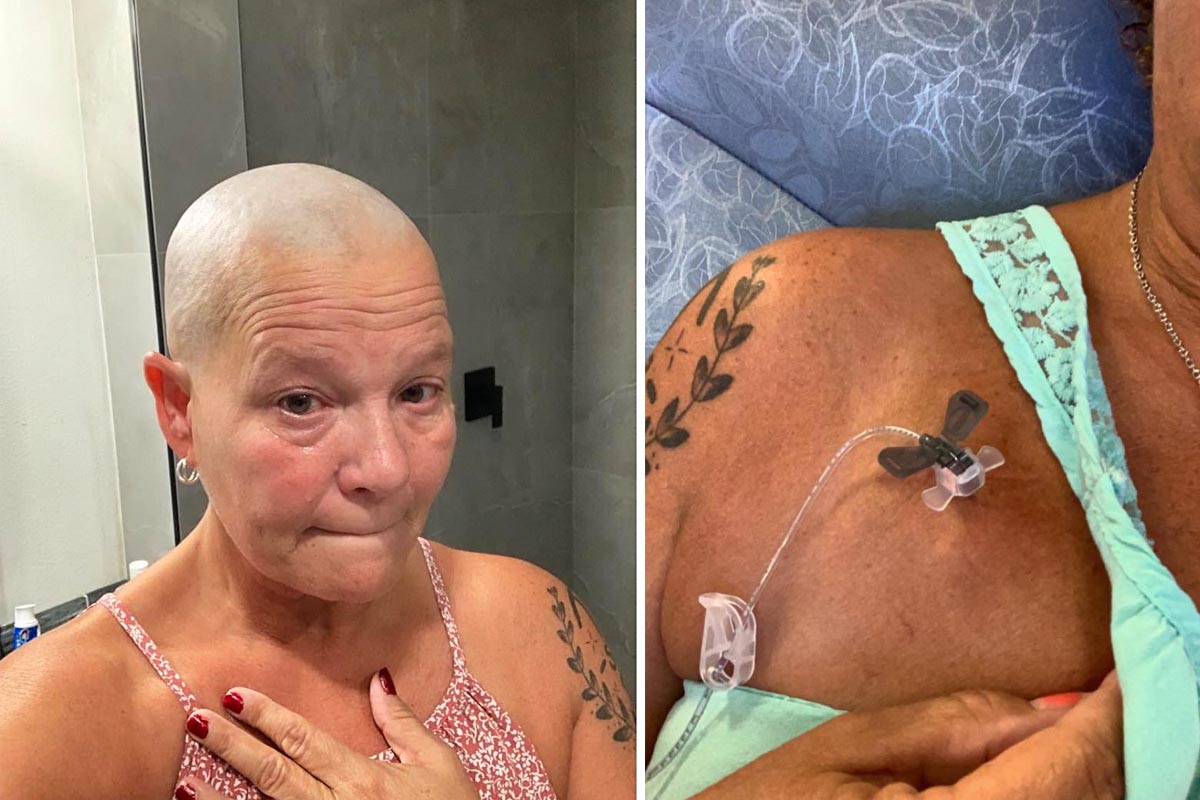Written by Stel Bailey | A contributor dedicated to sharing stories of resilience, advocacy, and the human spirit.
BREVARD COUNTY, FLORIDA — On a sunlit morning, April McGee stands at the edge of a busy street, holding a handmade sign high above her head as cars rush past. Each wave of her arm sends a quiet message of defiance, even as the arm itself carries the scars of lost lymph nodes. Across her chest, the faint but unignorable trace of 150 staples tells the story of a battle fought and endured. Though vulnerability shadows her every move, her mission is unshakable: she is determined to save lives.
“I don’t know how much time I have left. It’s not if the cancer comes back—it’s when,” April says. “I want to save someone’s mom, sister, or daughter. A pink ribbon shirt doesn’t tell you the truth. This is the reality of breast cancer.”
A Diagnosis That Changed Everything
Her life tilted in an instant after a routine mammogram revealed stage 2B breast cancer, already spreading into her lymph nodes. April had to pay for the imaging herself, cobbling together the cost while living paycheck to paycheck. The first call she made after hearing the results was to her husband, Paul.
“The diagnosis ripped through our life like a tornado,” she recalls. “It threw everything everywhere. I couldn’t believe it. I was in my early forties and had cancer.”
Paul witnessed every painful transformation: the surgeries, the chemotherapy, the radiation. When April finally stepped out with her sign that read, “F— Cancer,” she was baring more than just her scars. The honks from passing cars, the flashing lights of emergency vehicles, and the cheers from strangers became fuel for her spirit. Those small gestures reminded her that she wasn’t fighting alone.
The Unseen Reality of Treatment
There is nothing neat or symbolic about the reality of breast cancer. There are no polished ribbons in the sterile rooms where patients sit alone, waiting for a doctor dressed head to toe in protective gear. It is here that the “red devil” drug drips into veins, strong enough to burn yet necessary to survive.
“During treatment, I barely existed while everyone else went on with their lives,” April says. “Cancer doesn’t just go away. The treatments may stop for now, but it doesn’t just disappear.”
She remembers the relentless vomiting, the metallic taste of every bite of food, the fatigue that made getting out of bed feel impossible. There were nights spent curled up on the bathroom floor, too weak to move, while Paul stood helplessly outside the door. She recalls the freezing baths to ease the burning of her skin, the hair loss, the memory lapses, and the painful goodbyes to parts of her body she had lived with for decades.
One memory seared into her mind is the day her mastectomy bandages were removed. She was alone in the room, forced to confront the new landscape of her body. Later, sitting in her car outside the medical building, tears fell freely as she thought about the countless women enduring that same solitude without a hand to hold or a voice to comfort them.
Another time, while putting away her radiation mold in a closet filled with patient masks, she was stunned by the sheer number. Each mask represented a person fighting their own exhausting battle. By the fourth week of radiation, April’s skin was burned raw, so tender she could not wear clothes against it.
 |
April McGee undergoes chemotherapy, her face reflecting both fatigue and determination as she continues her fight against breast cancer. |
Breaking Misconceptions
“One out of every eight homes you pass in your neighborhood will have breast cancer. Think about that,” April says.
She remembers the false relief many feel when they test negative for BRCA genes. Cancer, she reminds people, can still be influenced by lifestyle, environment, and diet. And for many in her own community, financial hardship keeps women from accessing mammograms at all. That is why she now dedicates her strength to raising funds and awareness.
The American Cancer Society reports that approximately one in eight women in the United States will develop breast cancer during their lifetime. April’s goal is not to spread fear, but to inspire support where it is needed most—close to home.
Standing for Others
Despite the swelling in her arms and the exhaustion that clings to her body, April waves to strangers with a smile. Her message is simple but urgent: “No one has to fight alone.”
She dreams of making life-saving screenings available to women who might otherwise never have the chance. In doing so, she hopes to give someone else’s mother, daughter, or sister the gift of more time.
In October, April took her advocacy to the streets of Brevard County. On Saturday, October 14, 2023, she stood at the corner of State Road 520 and Forrest Avenue at 9:00 a.m., and throughout the month she appeared in other locations across the county—a living testament to both the devastation and the resilience of those touched by breast cancer.
Donate to April through Paypal: http://PayPal.me/mcgeestrong


